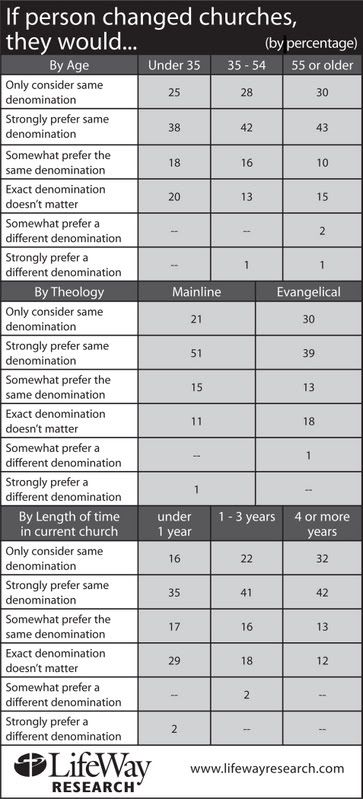LifeWay has released the results of research on denonimational loyalty among Protestant and evangelical church attenders. The study indicates that “one-third of all American Protestant churchgoers feel less than positive they will continue attending the same church in the near future. If they do switch, only about one out of four would only consider another church in the same denomination.” Baptists, we are told, are fairly typicial in their responses to the survey questions.
This information is not surprising or, at least, it shouldn’t be. Old line denominationalism is dead. That is different than saying that old denominations are dead, though, in some cases, that also is patently true. Those leading the Southern Baptist Convention would do well to think deeply about what this research indicates. It could, I think, help give some insight into some of the frustration that is arising in the not-always-very-successful-attempts at communicating across generational and cultural borders that are within the SBC.
The old ways of being Southern Baptist are fading fast. When I grew up SBC every church in the local association had RA’s, GA’s, WMU and knew who Lottie Moon and Annie Armstrong were. Convention Press was safe and, I was led to believe, sufficient for supplementing my spiritual growth. As late as my college years I remember rebuffing a roomate who tried for a year to get me to read a book that had tremendously helped him spiritually. I took one look at the spine and, not seeing “CP” or “Broadman Press,” tossed it back on his desk with a dismissive sectarianism and said, “I’m not interested.” The fact that the front cover had Knowing God and identified the authory as J.I. Packer meant nothing to me (pause for a moment of unresolved embarrassment!). I doubt that many Southern Baptist college students would harbor those same thoughts today. The denominational world has changed.
Ultimately, this is a good thing, I believe. Blind loyalty is never wise. By getting over that when it comes to a denominational identity one is free to pursue unreserved loyalty to Jesus Christ and out of that loyalty identify with a local church and/or denomination. Such people make the very best kinds of church members and churches comprised of such members make the best kinds of denominations.
From my limited vantage point, what I see happening is this: Some who are currently leading the SBC have grown up in the old world (or else have bought into it while growing up in the new) and are having difficulty coming to terms with the new one. Consequently, they sometimes mistake loyalty to Christ as being “anti-denomination” when they hear those who, out of devotion to Christ, speak critically of the covention. I am not suggesting that the defenders of the denomination are not loyal to Christ. Love compels me to believe that they are. But, like my own attitude in my college dorm room, their devotion to Christ tends to be expressed denominationally, so much so, that they sometimes come across as “my denomination, right or wrong.”
When post-denominationalists and denominationalists talk about the denomination, it is very easy to miscommunicate by talking right past each other. This research by LifeWay could become a useful tool to help facilitate better communication as we press forward to what I hope will be a very bright and Gospel-productive future for the SBC.
Here is a chart of some of the findings:





















